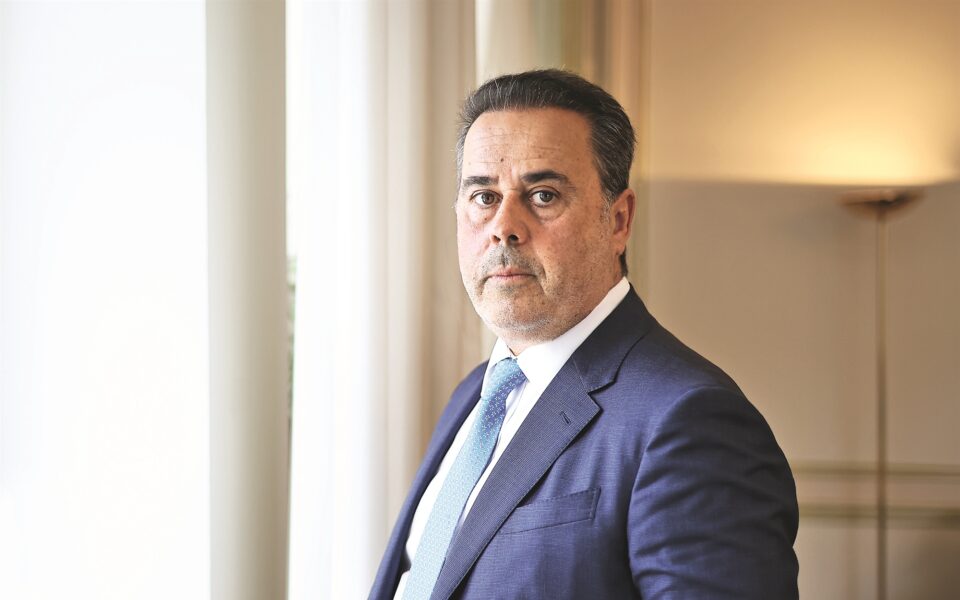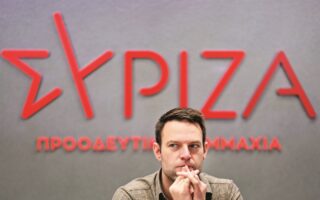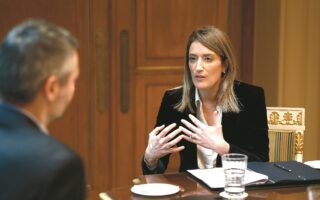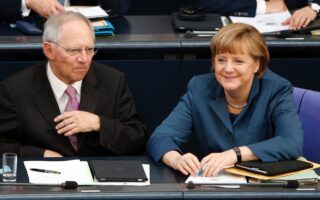‘New Democracy is a multifaceted party’
Close associate of the prime minister talks about tensions with the Church, the national strategy for the disabled and the apology he never got

There is an “invisible thread” connecting the conservative governments of Antonis Samaras (2012-2015) and the current administration of Kyriakos Mitsotakis, according to Minister of State Stavros Papastavrou, who served in the former as a member of the team negotiating with Greece’s international creditors.
Speaking to Kathimerini, the New Democracy official outlines the government’s plan for people with disabilities, which he helped draft, while sounding the alarm over the specter of far-right populism.
Papastavrou also talks about the ordeal of standing accused of financial crimes and being publicly pilloried by the opposition before being exonerated by a court of law.
Let’s start with the political news: In recent months, the government has been confronted with reactions from various community groups, such as farmers and freelance professionals. Do you feel that the relationship between the New Democracy party and these community groups has been damaged?
New Democracy’s relationship with both farmers and freelance professionals is steadfast, because just growth is in our party’s DNA. Look at the key economic indicators: Unemployment is down to single digits for the first time since 2009, we have cut or abolished 50 taxes and Greece is growing at three times the rate of the eurozone. These are not dry numbers on a piece of paper; they benefit us all. They show real improvement in the daily lives of citizens, without implying that high prices are not still the dominant problem today. Recognizing the difficulties that exist, we are moving forward with honest dialogue and sensible policies, but without compromising the country’s fiscally responsible course. We are confidently leading the European dialogue towards a fairer and smoother green transition, but with care and moderation, especially in the agricultural sector. Our main objective is always to ensure that government intervention increases national wealth, promotes our country’s competitiveness and is socially just, without leaving anyone behind.
The Church of Greece seems to be escalating its stance against same-sex marriage, lashing out at the government and against the MPs who voted for the law. Do you think that this attitude reflects real social discontent that will also be expressed in the upcoming European elections?
The government’s recent legislative initiative was passed by a majority of 175 MPs from five different parliamentary groups, with 77 voting against it. I fully understand and respect our church, which has clearly stated its positions on the basis of Orthodox teachings. Moreover, as the archbishop himself has clearly emphasized, the Church does not engage in politics, it does not side with the government or against it, it does not favor any political parties; its place is among the people. Anything else would be unconscionable and at odds with its mission. I believe that the temporary turmoil will soon be forgotten.
The parties to the right of New Democracy have 18% of the vote, the highest percentage in recent years. Do you find this alarming?
The constant and successive international crises of recent years have increased feelings of insecurity and, consequently, populism, which appears in different forms. There will always be forces that offer easy solutions to difficult problems. This phenomenon, which deserves attention, is being seen across Europe – and with greater intensity – but in Greece it has specific characteristics. These are disparate groups with different aspirations, with different provenances, such as disaffection with traditional political forces. New Democracy has always acted as a buffer against the dead-end and cheap populism for which our country has paid dearly. These are the stakes of the 2024 European elections: Whether we will move toward a competitive, strong Europe, which raises the curtain on cooperation in the defense industry, and whether we will strengthen the forces of unity and progress that move Europe and Greece forward, or those of populism that endanger our future. A vote for ND is a European, patriotic vote. It strengthens our country’s position in a united Europe.
‘Tsipras continues to deny me basic moral vindication, as a minimum compensation for the slander and defamation I suffered for six years’
As a longtime member of the New Democracy party, do you share the view that expanding toward the center threatens to alienate the party from its traditional base?
New Democracy is a multifaceted party. It was our founder Konstantinos Karamanlis who first combined the right with the center. Today, 50 years after its establishment, we are the party that 41% of Greeks trusted in the last national elections – and we are proud of that. Opening to the center not only does not create a distance with our base, but expands it, bringing into our party those who share our values and ideals. Those who believe in economic growth, healthy entrepreneurship, responsible patriotism, the defense of rights and freedoms, while supporting the weakest and the welfare state, have a place in New Democracy without alienating its traditional voters.
The opposition accuses the government of a cover-up in the Tempe railway disaster. The question is why gravel and concrete was poured over the main part of the crash site and also what the freight train was carrying which may have caused such a mighty explosion when it collided with the passenger train. Are there any answers?
The Tempe accident is a national tragedy that should unite us, not divide us. It is inappropriate to exploit it for partisan reasons. With absolute respect for the individual and collective pain involved, we must be cautious and reasonable before uncritically accepting rumors. There is no Greek who does not demand full disclosure, without the slightest shadow of a doubt, so that the truth may shine through. The case is now in the hands of the independent Greek justice system so that all the answers can be given and justice can be done. We have full confidence in the institutions and pillars of our democracy.
In a recent interview, former prime minister Alexis Tsipras admitted that his government “mishandled” the Novartis case. You had come under fire when his SYRIZA party was in government with Independent Greeks. What were your thoughts when you heard Tsipras’ admission?
Tsipras’ self-criticism was lacking. On April 20, 2016, as prime minister, in response to a question from then opposition leader Kyriakos Mitsotakis in the parliamentary plenary session, he had said that if I was vindicated – which I was – he would apologize. Tsipras continues to deny me basic moral vindication, as a minimum compensation for the slander and defamation I suffered for six years. Six nightmarish years, not only for me, but for my children, my wife, my parents, my friends. I hope no one experiences the injustice, the humiliation and above all the hatred that I experienced at the hands of my political opponents.
You were in the inner circle of former conservative prime minister Antonis Samaras, as you are now with Kyriakos Mitsotakis. The former prime minister appears to never miss an opportunity to disagree with the government, from foreign policy to taxation and family law. How do you explain this divide? Is there a way to bridge it?
There is an “invisible thread” connecting the 2012-2014 Samaras government with that of the Mitsotakis government. It was the government that kept Greece in the eurozone in extremely difficult times – with the sacrifices of the Greek people, with self-denial and patriotism. It was this government that laid the foundations on which Mitsotakis’ government is planning and implementing its reform program, a program that helped Greece regain investment grade, strengthen its deterrent capabilities more than ever and achieve macroeconomic indicators that seemed impossible a few years ago. Samaras, whom I have always respected, is therefore entitled to express his views and his disagreements as a former prime minister who, moreover, has special privileges to intervene under the rules of the House. Today I serve the Mitsotakis government and I am working to achieve its reform goals.
You have also dealt extensively with the case of Fredi Beleri, the jailed mayor-elect of the ethnic-Greek Albanian city of Himare. He was sentenced last week to two years in prison. How does Athens plan to react?
The Beleri case is a serious embarrassment for Albania and its institutions. Fredi Beleri, the elected mayor of Himare, has been in prison for 10 months for allegedly buying eight votes for 340 euros. He was sentenced to two years in prison at the end of a hearing in which the prosecution’s main witness admitted that he had been bribed with around 7,000 euros by the police to wear a wire during his conversations with Beleri’s lawyer. This raises serious doubts about the credibility of the trial and the objectivity of the verdict. The presumption of his innocence was violated by a series of statements that prejudged his conviction. The Greek government has systematically raised this issue in all European fora and will continue to do so. It has linked Albania’s European prospects to respect for the rule of law. Consider this: The non-elected mayor of Himare has remained for 10 months in the position of the elected mayor, who is in prison. This is not a bilateral issue, but first and foremost a European issue. Fredi Beleri must be sworn in as mayor of Himare, immediately released from prison and given a fair trial at the appellate level. Greece will continue to follow this matter closely.
You were present when a Russian missile exploded near the Greek delegation during the recent mission to Odesa. Can you describe what happened? Were you in danger? Were you afraid?
It was a frightening moment. The piercing siren, followed by the deafening crackle and then the smoke from the explosion – not far from our group – set off so many intense emotions. In Ukraine, war does not discriminate. It is a constant battle for life, freedom and independence. Those of us who were in Odesa, the city with timeless Greek roots, witnessed in one moment the brutal and uncontrolled violence that the Ukrainian people suffer on a daily basis.
You have shown a particular interest in the government’s plans for people with disabilities. What can we expect in the coming period?
The National Strategy for the Rights of Persons with Disabilities 2024-2030 will be presented for public consultation in the coming weeks. With specific objectives and actions to be undertaken by every ministry and with measures to mobilize local governments, it is a first for our country. Any issue that affects all Greeks is national. And improving the quality of life of more than 1 million fellow citizens with disabilities is a national concern. The national strategy has inclusion at its core and is aimed at “dual convergence,” that is, improving the quality of life of people with disabilities, both in relation to the general population of the country and to people with disabilities in the European Union. There is no doubt that we still have a long way to go. Through the horizontal actions of the national strategy, we are trying to increase the visibility of people with disabilities and intensify our work to remove barriers and build a truly equal society, which is the top priority of the Mitsotakis government.





